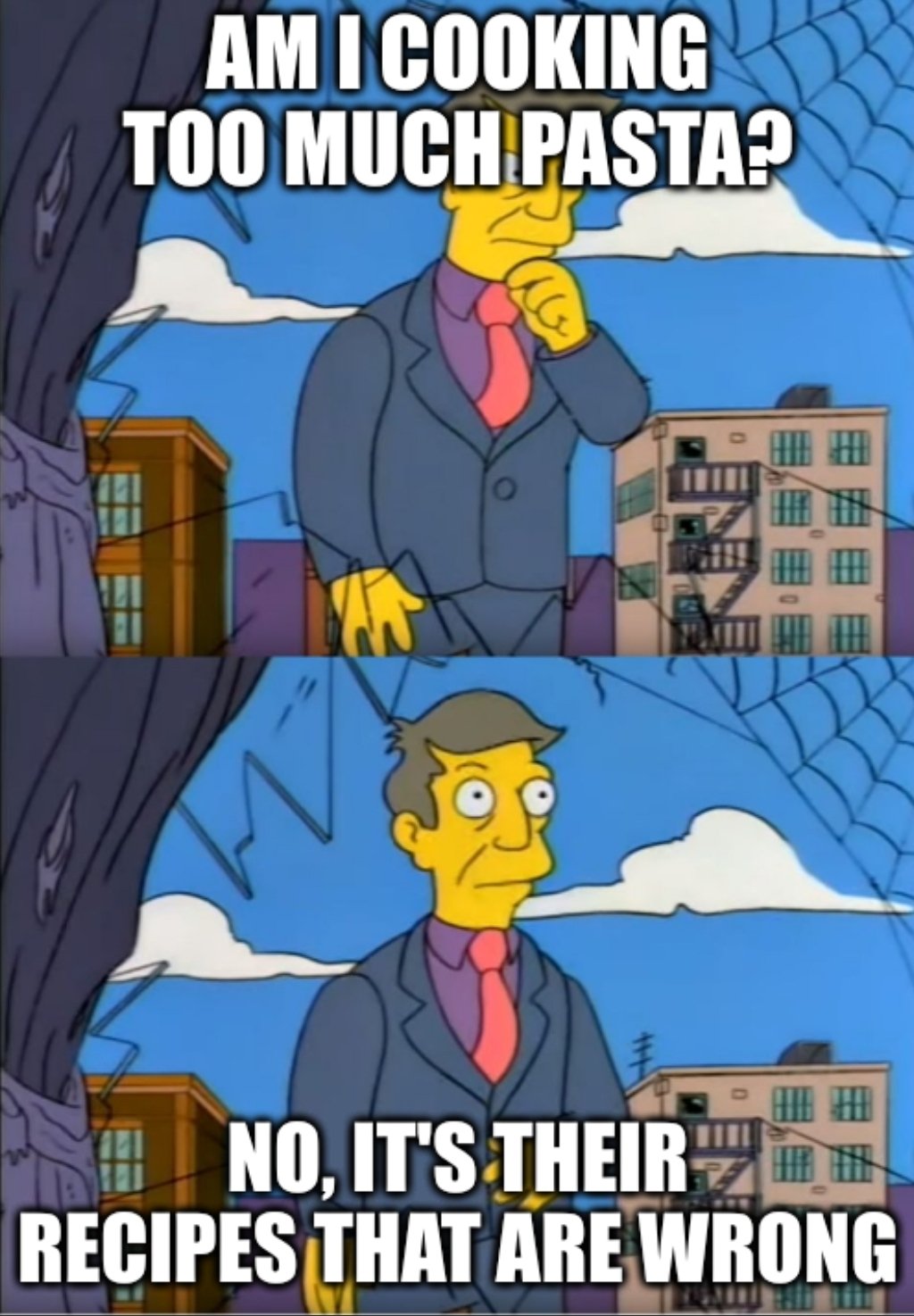- cross-posted to:
- nonpolitical_memes@lemmy.ml
- cross-posted to:
- nonpolitical_memes@lemmy.ml
Do you cook your pasta in a large pot, with plenty of boiling water, and a good amount of salt? Usually I just stir once just after putting the pasta in, and I never have noodles sticking together.
It depends on the pasta (form, freshness, self-made… etc). Some has to be stirred 3-4 times others just once, in my experience.
My pot would have to be 3x its size to fit the amount of water a single package of pasta says I should use.
1kg to 10l
Do you have a bathtub in your stove?No, but 1kg of pasta? Are you feeding a battalion?
Matter of definition really
Definition of what?
Definition of battalion
Only the best musicians blame their pot.
TBF, pot has played a big role in the making of some great music
As others have already said, that is a lot of pasta. If you regularly cook volumes like that, it would really make sense to invest in a large pot as well. A cheap 10l pot will do just fine for boiling pasta, and it sounds like you would get plenty of use out of it.
1 kg of dry pasta is enough for 10 people! Do you often cook for that many people? (Genuine question)
Not in my experience, I usually count 200g per person
That’s a LOT of pasta per person. Not unheard of, but still a lot
Me going through this thread

This is making me chuckle, because I just did this last night for a dinner party. It was a hell of a lot of pasta for 7. I kept it moving, even in my big stock pot. Only a few strands stuck to the bottom. We have leftovers.
I usually cook a quarter of that for the two of us, sometimes half if I want to eat for a couple of days.
2lbs/1 kg is a lot.
I do have a 10 L pot, I use it for making stock and beer
I have a 12 gallon pot I use for the same.
If it didn’t have the spout off the front I’d probably use it for a lot more stuff like huge batches of chili (for canning). I end up using multiple pots for that instead because I don’t want to have to clean around the dumb thing.
But the drain tube makes it soooo easy to strain the broth.

Me who never stirs and never gets sticky pasta…
Stop using butter.
This meme is about boiling pasta. You butter before you boil? Weird.
Gross, people do that?
it’s indeed gross to stop using butter
The oil keeps the water from boiling over. The downside is that the sauce won’t stick as well.
It’s not salting your water, nor the water volume to pasta ratio, nor if the water is boiling or not, nor oil in the water, but stirring early in the cooking process that will prevent sticking.
From the great Kenji Lopez-Alt:
Pasta is made up of flour, water, and sometimes eggs. Essentially, it’s composed of starch and protein, and not much else. Now starch molecules come aggregated into large granules that resemble little water balloons. As they get heated in a moist environment, they absorb more and more water until they finally burst, releasing the starch molecules into the water. That’s why pasta always seems to stick together at the beginning of cooking—it’s the starch molecules coming out and acting as a sort of glue, binding the pieces to each other, and to the pot.
…
The problem is that first stage of cooking—the one in which starch molecules first burst and release their starch. With such a high concentration of starch right on the surface of the pasta, sticking is inevitable. However, once the starch gets rinsed away in the water, the problem is completely gone.
So the key is to stir the pasta a few times during the critical first minute or two. After that, whether the pasta is swimming in a hot tub of water or just barely covered as it is here, absolutely no sticking occurs. I was able to clean this pot with a simple rinse.
Wow, this guy is amazing!
Yep, I really like how he applies the scientific method to cooking. Some of my favourites are how he’s found the perfect way to boil an egg, cook steaks and roasts (dry brine, reverse sear), and make chocolate chip cookies (he made over 1500 cookies testing how changing each variable changed the final cookie).
Yeah you only need to do it once in the beginning. Say a seconc time to make time pass.
Not salting the water is a crime against humanity though so be aware.
Oh yes, I’m not saying don’t season your water. Just that seasoning the water on its own is not a way to prevent pasta sticking.
My biggest gripe with cooking instructions is the non-specificity. “Stir pasta frequently”? How frequently? How continuously? Tell me in unit Hertz
What kind of dumb instructions are that?
Stirring exactly once is enough in most cases.
Maybe a graph of how strong the bond gets over time for 2 elements?
Is this a meme I’m too Italian to understand?
Yeah, I also don’t get it. I don’t stir pasta, maybe once in the middle. It never sticks.
Skill issue

Gift
Y’all need to salt your water.
It prevents nearly all the sticking and it makes pasta delicious
And while you’re at it, shell out the extra 50 cents or whatever for the bronze cut pasta. It has a much nicer texture and allegedly makes sauce adhere to the pasta more.
Bronze cut cavatappi is the superior macaroni.
I have actually never seen this before. Other comments are saying its because you dont salt your water and i do so probably thats why. It also makes the taste better so overall recommended.
You can add some oil so pasta won’t also stick when you have cold leftovers. I add both oil and salt in the very beginning, because there’s no reason to not do that, and I have a feeling of the right amount compared to the amount of water.
And I stir once, about a minute after putting the pasta in, because something tends to stick to the bottom in the very beginning. Afterwards, it’s just not necessary.I add both oil and salt in the very beginning, because there’s no reason to not do that.
If you really like to impregnate your pasta, so that it won’t absorb your sauce (or less well), then you are right about the there-is-no-reason-part in your answer.
You ever heard the saying “like oil and water”? Oil doesn’t mix with water. It floats on the surface. Adding it just wastes 100% of the oil.
deleted by creator
Oh, thank you for providing me with this rare knowledge. But what happens while you boil pasta, is pasta turning around and soaking the oil in. I wouldn’t be doing that if it wouldn’t help with pasta stickiness.
And as other people comment here, oil gets into pasta so you can have a problem with sauce not soaking in, but when I’m making something like bolognese, I sometimes pour pasta into the frying pan with the sauce, so it’s getting there for sure.
Mario Batali over here.
?
It’s really the first couple minutes that are critical
Salty like the ocean
Is bullshit you don’t want that much salt

I’m not saying don’t salt it, just not as salty as the ocean, you just don’t need that much
You do in the water. The pasta won’t absorb all of it
I’ve tried boiling pasta in ocean water. They were inedible.
If the ocean is the baltic sea then it makes sense as it has salt content ranging from 0.5~1.5

Lidia taught me that
I’ve never once had pasta sticking together in the pot, regardless of what I do.
Removed by mod
What kind of pasta do you use?
Salt and Oil would do wonders….
Oil is bad for sauces sticking to pasta though.
137 times more powerful than the Electromagnetism you try and use to tear them apart, behold the Strong Pasta Friendship Force!
Do you not put just a little oil to make them unstick with each other?
Nah that is another myth, it will just make it harder for your sauce to stick to your pasta. Add salt and it won’t stick together.
It’s that goblin fuck from sin city having an orgy.
That goblin fuck doesn’t have the tools for a proper orgy













